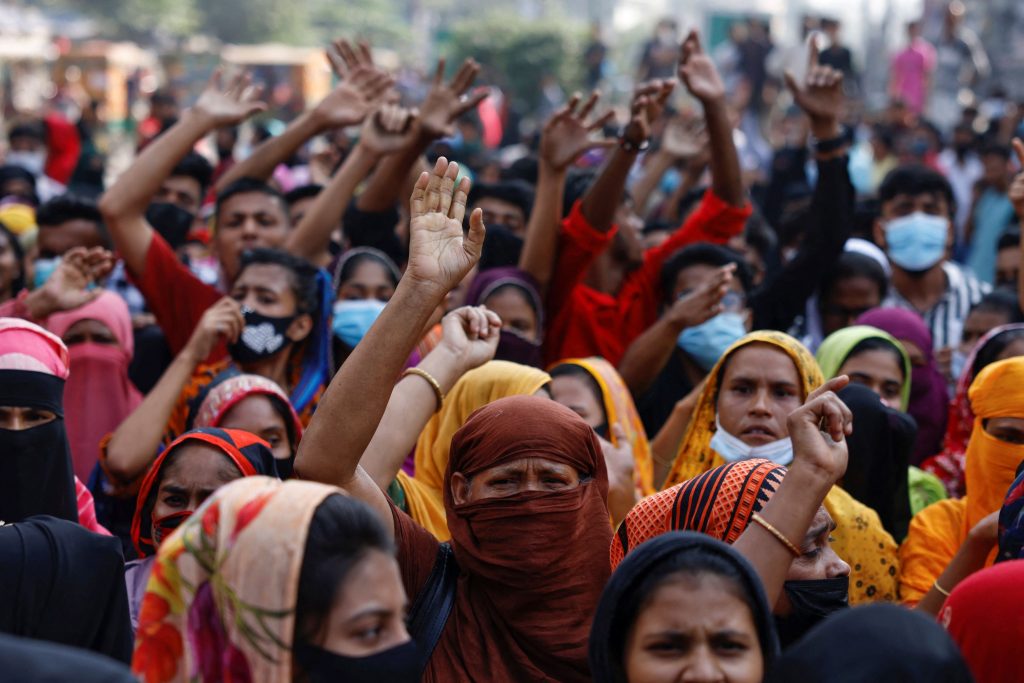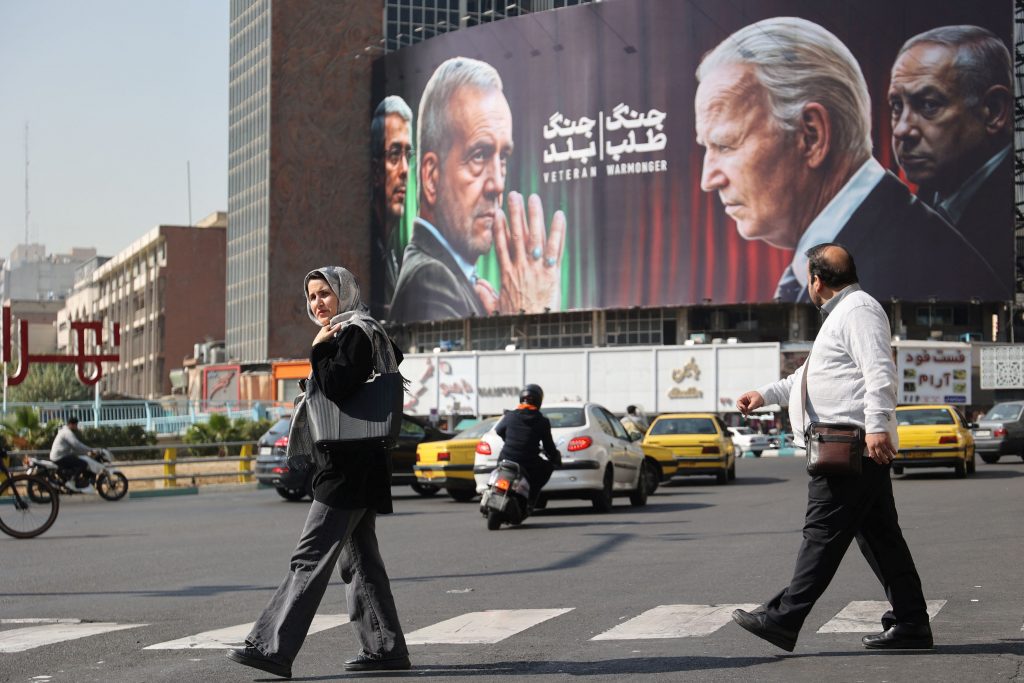In Syria, rebels raced to Damascus , ending Bashar al-Assad ’s 24-year-old dictatorship , which few in the outside world thought was in danger of collapse. In August, student protests sent Sheikh Hasina’s 15-year reign in Bangladesh crashing down.
Other authoritarian leaders and their governments came under new pressure in 2024, from Nicolás Maduro’s iron-fisted regime in Venezuela to the mullahs of Iran to the military junta of Myanmar .
In a world President Biden has cast as split between democracies aligned against a rising tide of autocracy, authoritarians suffered unexpected setbacks in 2024 that exposed their weaknesses, geopolitical analysts and historians said.

Syria’s President Bashar Al-Assad and wife Asma arrive at a dinner during a EU-Mediterranean summit in this file photo taken in Paris July 13, 2008. REUTERS/Yves Herman/Files (FRANCE – Tags: POLITICS PROFILE)
“Some positive things happened in terms of autocracies wobbling or, in a couple of places, falling,” said Larry Diamond , a Stanford University scholar who has written books on authoritarianism and the challenges facing democracies. “There are a lot of autocracies that are weak or kind of dazed.”
Regime change can be exciting on the ground, but it now presents a challenge to new leaders in Bangladesh and Syria to create lasting, inclusive governments, something that has proved difficult elsewhere following political upheavals.
Syrian rebels—whose roots go back to Islamic State and al Qaeda—pledge to respect minorities, but it is unclear whether they have truly shed their hard-line sympathies. Demonstrators fill the streets of Bangladesh’s capital, Dhaka. There are allegations of lynchings of people connected to Hasina ’s political party. And Bangladesh’s powerful neighbor, India, is accusing the new government of failing to protect minority Hindus, a charge the Bangladeshi leadership rejects.
“Expectation level is high,” said Muhammad Yunus, a Nobel Prize-winning Bangladeshi economist who is now the country’s interim leader. “Matching this is very difficult.”
To be sure, most despotic governments are still firmly in place, from Miguel Díaz-Canel in Havana to Vladimir Putin in Moscow. Russia—with the help of Iranian arms, North Korean troops and oil sales to China—has made battlefield gains against Ukraine.
The alignment of China, Russia, Iran and North Korea—a group some analysts call “Crink”—has grown stronger. China is leapfrogging the West in some key technologies and has built strong ties with U.S. neighbors in Latin America.
President-elect Donald Trump ’s approach toward autocrats will become clearer as he tries to halt the fighting between Russia and Ukraine, stop Iran from acquiring a nuclear weapon and manage the fallout from Venezuelan strongman Maduro ’s disputed election win.
This year’s troubles for autocrats have lent momentum to opposition groups around the world. Venezuela’s opposition is arguing that Assad’s fall shows how dictatorial regimes that look invincible can collapse, if the right pressure is applied.
Political analysts who study democracies and autocracies warn that it is difficult to predict when authoritarian rule will crumble in a given country.

Garment industry workers shout slogans as they continue to protest in the street for their wage raise, at Mirpur area of Dhaka, Bangladesh, November 12, 2023. REUTERS/Mohammad Ponir Hossain
Marcel Dirsus, a political scientist and author of “How Tyrants Fall,” a book about dictatorships published this year, said autocratic governments direct government resources to a narrow circle of supporters to remain in power. The practice rewards loyalty, but the broader population bristles at favoritism and corruption.
“In dictatorships there’s a very thin line between stability and chaos,” Dirsus said. “Staying in power in these regimes requires difficult decisions every day.”
Assad’s fall has resonated in part because it showed the frailty of its alliances with other authoritarian regimes.
For almost a decade, Assad benefited from an alignment with Russia, Iran and a group of militias antagonistic toward Israel, often called the “Axis of Resistance.”
The group presented a strategic counterweight to the U.S. and Israel in the Middle East and appeared to be growing stronger last year as the Arab world began recognizing Syria and Iran diplomatically after years of isolating them.
This alliance was tested after Hamas, the Palestinian militant group in the Gaza Strip, launched the Oct. 7, 2023, attack on Israel. And in just over a year, it crumbled. Russia and Iran didn’t have the strength to prevent Assad’s fall.
Among foreign powers, the biggest loser from Assad’s fall was Iran’s theocratic government. It had extended billions of dollars of oil sales to Syria on credit, had hopes of building a new business empire in the country and used it as a perch from which to threaten Israel.
This year, in addition to losing Assad, Iran’s proxies lost in Gaza and Lebanon. Israel also struck on Iranian soil for the first time—bombing the country’s antiaircraft systems and carrying out assassinations inside its borders. Meanwhile, Iran’s missile attacks on Israel caused little damage.
“Iran is the symbol of the failure of autocracies,” said Moises Naim , a distinguished fellow at the Carnegie Endowment for International Peace who has written extensively on democratic backsliding.
Those who suffer the most when authoritarians fall on hard times are often ordinary people.
The Iranian currency has fallen hard, and discontent is widespread. The government also faces a dire energy shortage that has caused electricity outages, despite having some of the world’s biggest reserves of natural gas and crude oil. The problems could worsen as Trump has said he would resume what he calls maximum-pressure policies on Iran.

Iranians walk next to an anti-U.S. and Israeli billboard with pictures of Iranian President Masoud Pezeshkian and Iranian Armed Forces Chief of Staff, Major General Mohammad Bagheri and U.S. President Joe Biden and Israel’s Prime Minister Benjamin Netanyahu, on a street in Tehran, Iran, October 27, 2024. Majid Asgaripour/WANA (West Asia News Agency) via REUTERS ATTENTION EDITORS – THIS IMAGE HAS BEEN SUPPLIED BY A THIRD PARTY ATTENTION EDITORS – THIS PICTURE WAS PROVIDED BY A THIRD PARTY
In Russia, the ruble is plunging and inflation is soaring. The Biden administration’s decision to ratchet up sanctions on Russia’s Gazprombank could gum up Moscow’s already constrained trade with commercial partners. The country has suffered 750,000 casualties in the war in Ukraine, the U.K. estimates.
“[Putin’s] hand is weaker now,” said Thomas A. Shannon Jr., who as the State Department’s undersecretary of state for political affairs negotiated with Russian diplomats from 2016 to 2018.
The problems extend to Asia, where the Chinese Communist Party is struggling with slowing growth and a sinking property market. China’s leaders are preparing for tough tariffs from Trump, which could exacerbate the country’s economic slowdown and sow doubt about the party’s promise to deliver widespread prosperity.
Myanmar’s military junta, which heavily relies on trade and diplomatic support from Beijing, has lost bases and vast stretches of territory to various rebel groups. Some analysts now question whether the military, which has been a dominant force since the country’s 1948 independence and took power in a 2021 coup, is on its last legs.
“The overall trajectory is one of serious decline,” said Morgan Michaels, a Myanmar expert with the International Institute for Strategic Studies think tank, though he noted that regime soldiers have shown fighting spirit at key junctures.
Stanford’s Diamond said a range of semi-authoritarian parties—some ensconced for many years—either lost power or suffered setbacks that curtailed their authority this year. In Botswana, the Democratic Party, in power since 1966, lost a presidential election. Turkey’s opposition won several major cities in local elections in March, dealing a blow to President Recep Tayyip Erdogan ’s ruling party.
“In a lot of places,” Diamond said, “elections did what they’re supposed to do.”
Write to Juan Forero at juan.forero@wsj.com and Jon Emont at jonathan.emont@wsj.com


